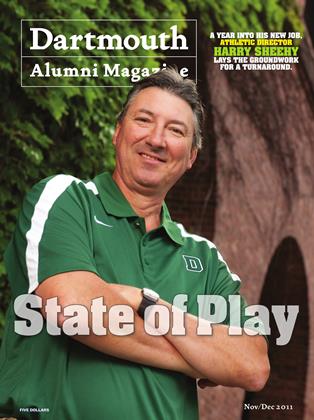The Beat Goes On
For more than three decades professor Hafiz Shabazz has tuned students into the rhythm of life through drumming.
Nov/Dec 2011 Ben Moynihan ’87For more than three decades professor Hafiz Shabazz has tuned students into the rhythm of life through drumming.
Nov/Dec 2011 Ben Moynihan ’87For more than three decades professor Hafiz Shabazz has tuned students into the rhythm of life through drumming.
AS A CHILD OF 5 GROWING UP in Philadelphia, Hafiz Shabazz, now 64, fell in love with music while listening to his Jamaicanborn father’s Calypso records. “it was harry Belafonte and King Sparrow and others whose names i can’t recall because that was so long ago,” shabazz says, laughing.
After learning the clarinet and bass sax in junior high and playing in a neighborhood band, Shabazz turned to drums in high school and discovered a passion for his roots that took him to Ghana to study music and drumming in the early 1970s. He returned to Philadelphia to spend several years as a percussionist with the famed Arthur Hall Afro-American Dance Ensemble, followed by performances with jazz greats, further study in Brazil and Cuba and a 1984 master’s in education from Cambridge College.
It was in connection with Arthur hall’s 1978 residency at Dartmouth that Shabazz first came to Hanover. That led to his appointment in 1984 as director of the College’s popular World Music Percussion Ensemble (WMPE), with which he also performs at its three yearly concerts. (On November 16 the ensemble will perform Brazilian music at the Hop.) Composed of about 20 students and local drummers, the group also showcases the talents of other musicians and vocalists needed for its international repertoire.
In the past three decades the WMPE has attracted more than 600 student members. Former geography major and football quarterback steve Ferraris ’78, who now performs and teaches hand drums at the University of Vermont, came to music through the WMPE. “When [football] was over, i heard about an African drumming ensemble. At every level of the things i’m doing 30 years later, I got my first experience with hafiz,” he says.
Christina Chen ’12 saw shabazz play at her freshman orientation and was blown away. “i’d played classical piano for 16 years. This was less structured, more creative, more improvisational,” she says.
“There is a wow factor when he builds us up, and it works to the point where anyone can solo,” adds si Jie loo ’12, who grew up playing Chinese music in Malaysia. She says Shabazz impels students to understand what it means to play in sync.
Besides directing and performing with the WMPE and playing with a local band, shabazz also teaches “oral Tradition Musicianship,” a course he designed shortly after coming to Dartmouth to encourage students to dig into their ancestry. “Music is just a way in,” he says of the course, which requires students to keep journals. “not only do most students not know much about their own histories, but they don’t see themselves as historical figures in their own right. i tell them, ‘if you don’t write about yourself, no one else will.’ i make them present their own histories to the class, so by the end of the term everyone in the class will know about the culture of everyone else, whether Chinese, German, irish or African.”
Shabazz writes in his own journal at least three days a week. “i tell my students you will want to look back to see what happened when you were at Dartmouth,” he says. Being able to review his notations in the past year on the death of his beloved German shepherd and his heart attack and subsequent triple bypass gave him some perspective, he says. And returning to drumming “was a wonderful way to relax my body while stimulating my mind.”
His class draws music majors as well as those studying music for the first time. “i try to structure the course and spend enough time with the non-musicreaders during office hours so they can understand the assignments designed for the readers,” he says.
For Shabazz, music, whether contemporary or ancient, will always be about people. “it speaks to how life evolves as one passes from adolescence into older age and on into another life,” he says. “it reflects festivals, births, hardships, interactions with friends and relatives. It tells you what a village thinks and how a person is remembered.”
Hafiz Shabazz in his office.
BEN MOYNIHAN, a former member of the WMPE, is director of operations at the Algebra Project in Cambridge,
 View Full Issue
View Full Issue
More From This Issue
-
 Feature
FeatureBurned
November | December 2011 By Jane Varner Malhotra ’90 -
 Cover Story
Cover StoryIt’s a Whole New Ballgame
November | December 2011 By BRAD PARKS ’96 -
 Feature
FeaturePrimary Colors
November | December 2011 By LEE MICHAELIDES -
 ROUNDTABLE
ROUNDTABLEHow Safe Are We?
November | December 2011 By Matthew Mosk ’92 -
 ON THE JOB
ON THE JOBModern Vintage
November | December 2011 By Alexis C. Jolly ’05 -
 Article
ArticleNewsmakers
November | December 2011 By BONNIE BARBER
FACULTY
-
 Faculty
FacultySubject Matter
NOVEMBER | DECEMBER 2017 -
 FACULTY
FACULTY“This Is Gonna Work”
Sept/Oct 2009 By Bryant Urstadt ’91 -
 FACULTY
FACULTYLearning Curve
July/August 2005 By James Heffernan -
 FACULTY
FACULTYOut of the Ordinary
JANUARY | FEBRUARY 2017 By LAUREN VESPOLI '13 -
 FACULTY
FACULTYPoetic Justice
SEPTEMBER | OCTOBER 2015 By RIANNA P. STARHEIM ’14 -
 FACULTY
FACULTYThe Truth Is Out There
JANUARY | FEBRUARY 2016 By RIANNA P. STARHEIM ’14

